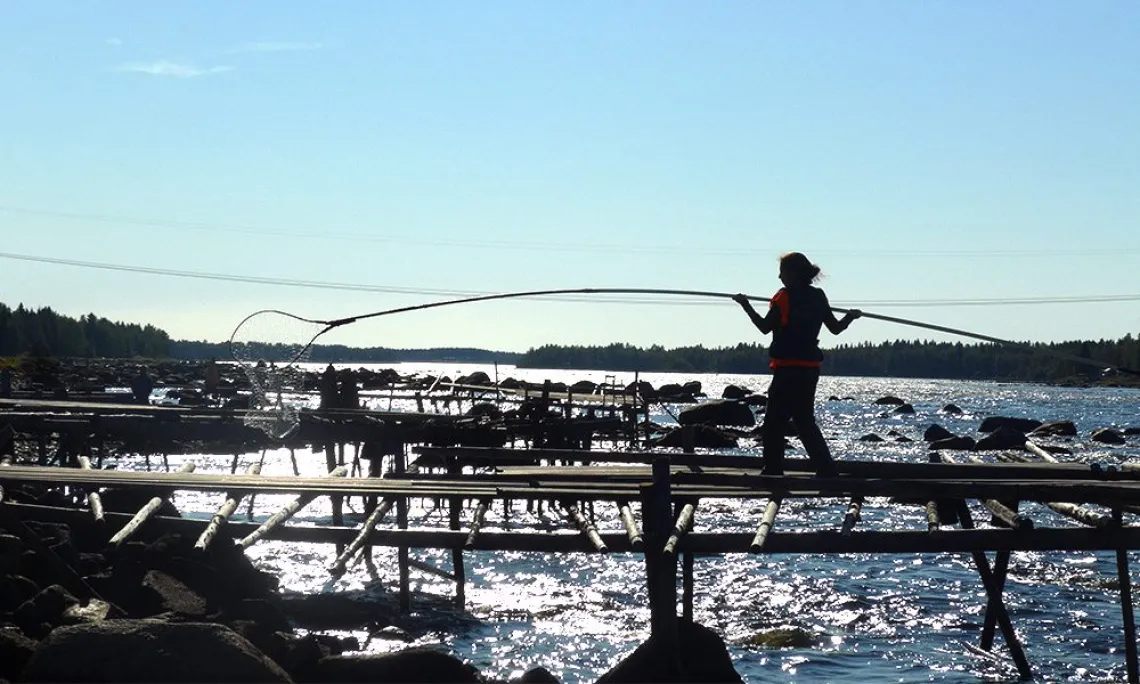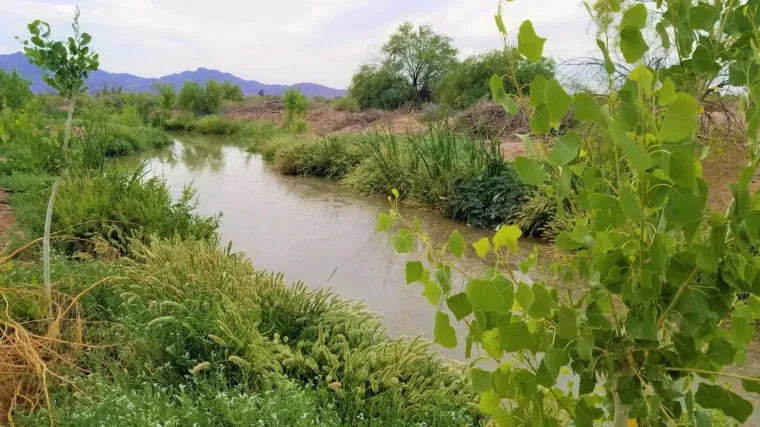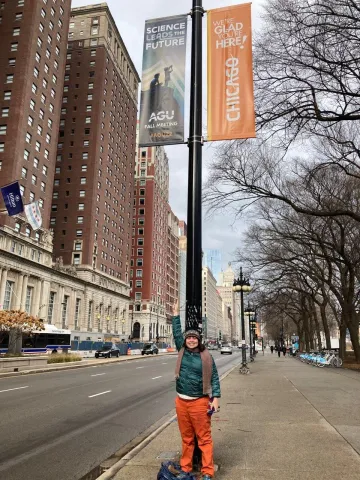The Indigenous Foods Knowledges Network: Research that Looks Beyond the Byline

Mary Beth Jäger tries her hand at dip net fishing during an IFKN trip to Tornio, Finland.
The Indigenous Foods Knowledges Network (IFKN) isn’t your typical National Science Foundation (NSF) research project.
Developed as a partnership between the University of Arizona and the University of Colorado Boulder and funded as a “cooperative research network” by NSF in 2017 (award number 1745499), IFKN began as a four-year effort to examine and build on the food security of Indigenous communities by connecting researchers and Indigenous community members in two environmentally extreme regions of North America – the arid desert southwest and the Arctic.
But, where the majority of NSF funding goes toward projects that aim to produce one or more peer-reviewed papers at the conclusion of their research, the IFKN project is less about answering a single, focused question by means of scientific analysis, and more about creating relationships between Indigenous peoples in both regions.
“Funding sources don’t usually allow for the much-needed time to build relationships,” explains Mary Beth Jäger, Research Analyst for the Udall Center’s Native Nation’s Institute and IFKN Co-Principal Investigator.
But, by approaching the development of IFKN as a cooperative research network instead of as a typical research project, Jager says that she and her team have been able to make inroads and create relational accountability with participants.
Sharing Indigenous Knowledge and Ways of Knowing
The goal of the IFKN, per its website, is to “develop a network comprised of Indigenous leaders, community practitioners, and scholars (both Indigenous and non-Indigenous) who are focused on research and community capacity related to food sovereignty and Indigenous Knowledge.”
The idea was to aid in the sharing of Indigenous Knowledges surrounding food security and production between Indigenous communities in the regions of the network, and to shine a light on the value of various types of Indigenous sources of information that may not always fit comfortably into the paradigms of Western science.
Though the Arctic and desert southwest may not appear to have much in common on the surface, both regions face similar challenges in the form of socioeconomic pressures and the constant stress of finding ways to survive and thrive in a rapidly changing environment.
By creating a safe space for the communities to discuss these challenges, the hope was that participants would create ways to work together and develop novel ways to solve these and other emerging problems.
A Personal Approach

Pee Posh Wetlands, a restoration area at Gila River Indian Community. Wetlands provide, among other things, grasses used for traditional basketry. Photo by Althea Walker.
The method the IFKN steering committee developed to best tackle these objectives was to hold in-person meetings on the home territories of the Indigenous peoples in both regions.
“It’s important to be on the land,” says Jäger. “It allows for the exchange to flow much better than it can in a conference room and allows Indigenous individuals to share and exchange knowledge in ways that they just might not otherwise be able to.”
For instance, a conversation about how one member of an Arctic Indigenous community was looking for a way to legally provide seal oil – an important cultural food – to elders in a care facility sparked a conversation between meeting participants about how they provide culturally important food to elders.
And, for the first two years of IFKN’s NSF grant, everything appeared to be going according to plan.
The group developed a charter during their first official gathering at the Gila River Indian Community in March of 2018. They were then invited to a Festival of Northern Fishing Traditions in Tornio, Finland to take a first-hand look at a river restoration project taking place on the Skolt Sámi homelands in northern Europe, and they followed up with two additional meetings on the Tohono O’odham Nation in southern Arizona in March 2019 and at the Nay'dini'aa Na'Kayax cultural camp – where they were the first community outsiders to be invited to the camp – in the Ahtna Chickaloon Native Village in Alaska in June of the same year.
IFKN was gearing up for their fourth official in-person meeting with the Hopi Nation in northern Arizona when the unthinkable happened.
COVID Pivot
In early 2020, the COVID-19 pandemic put an end to travel and in-person gatherings for the foreseeable future, meaning that IFKN was unable to continue with their proposed structure built around gathering together at regular intervals.
This led to the postponement of the planned visit to the Hopi Nation and the need to reevaluate the framework of the project given the uncertainty of when – or even if – they would ever be able to resume their work as it was initially envisioned.
The decision was made to pursue a NSF rapid grant (NSF-OPP Award #2035161) to examine the impact of the pandemic on IFKN’s focus communities in the Arctic and southwest. The group conducted dozens of interviews with Indigenous subject matter experts over the course of the next several months, with the effort ultimately culminating in an essay that was featured in the National Oceanic and Atmospheric Administration’s 2021 Arctic Report Card.
IFKN also held a total of four webinars in 2020 in lieu of their proposed in-person meeting. And so, the work continued.
A Non-Extractive Future
Their work derailed by the global pandemic, IFKN applied for a no-cost extension to continue the project beyond its initial proposed cutoff date of August 2021 and were given a revised end date of August 2023 for developing the cooperative research network.

Mary Beth Jäger under an AGU banner in Chicago
This extra time allowed the organization to hold their fourth official meeting on Hopi lands in September 2022 and supported a number of presentations on the topics of Indigenous Knowledge, research and food security for national audiences that included the Inter Tribal Council of Arizona, the American Fisheries Council, the Navigating the New Arctic Annual Community Meeting in November 2022, and at the American Geophysical Union Fall Meeting in December 2022. In February 2023 there are plans to present virtually at the Arctic Science Summit Week, which will be held in Vienna, Austria.
With the countdown to the end of the project now ticking away, the question of what comes next will be central to IFKN’s deliberations in the coming months.
Projects already underway include essays on Indigenous Knowledge and food security in the Arctic and the US southwest, as well as a comparative article outlining lessons learned from the COVID-19 project in both locales.
Currently, discussions are underway about what comes next but, in the meantime, planning for a final meeting before the project comes to a close is already underway .
Regardless of the shape these final efforts ultimately take, Jäger says that one question remains central to everything the IFKN does:
“How do we give the information and knowledge that’s come out of this project back to the communities?” she asks. “That’s the big thing that we’ve been working on: how do we make sure the communities that host us and our COVID-19 subject matter experts get information back so the projects are not extractive?”
It’s a question that may not be at the top of the list for all academic research projects, but one that ensures the IFKN’s impact will reverberate beyond the purely academic circles of peer-reviewed journals and conferences and hopefully continue the relationships formed through IFKN by contributing value to the communities involved.
For more on the Indigenous Foods Knowledges Network, check out the IFKN website here.

